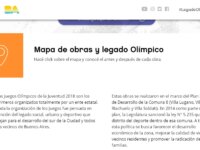Lisbon City Council is one of the 10 largest public purchasers in Portugal. The relevance of public procurement in the municipal activity led to the development of an internal portal - the Collaborative Purchasing Portal - to bring together all those who work in this area. With this Portal, the Lisbon City Council intends to foster an environment of trust, knowledge and sharing, and to strengthen the mission of its workers and the ties that unite them in a digital environment.
Innovation Tag Opengov: open local government
Bogotá-Colombia is a city co-administered by 20 local mayor's offices. In the past, it was on the Mayor's power to allocate resources without necessarily go through public or community consultations, which is why several city infrastructures emerged without responding to specific needs nor recognizing the diversity in the population. With the Civic Laboratories of participatory budgeting, the community began to engage on where to decide where to invest their local budgets.
Societal challenges such as demographic change affects rural areas in particular. The Social Foresight Lab is an innovative participatory approach towards rural development and technology transfer to address these challenges. It combines foresight, needs assessment and strategy development. Rural areas benefit, as it takes into account regional characteristics, initiates new cooperations among regional stakeholders, and integrates technological and social innovations into regional development.
GovTech Poland has developed world's first challenge based procurement model where the authors of the best idea receive a full implementation contract without the need for an additional cumbersome tender. With the goal of opening procurement to all creative individuals, the model covers the process from identification to implementation. A pilot run, tested in both central and local institutions has increased SME participation in procurement processes by an average of 1600% (in a sample of 250)…
Citizen-centric Municipal Governance Scorecard is an innovation for improving local good governance. The main objective is furthering local good governance through transforming good governance principles into practical, measurable processes and actions. The model consisted of 227 indicators for the seven principles along decision-making, resource allocation, service delivery and institutional capacity stages. The data collection is geared for citizen use, based on digitally available…
As a criminal court judge I felt the need to implement concrete actions to establish a new way of adjudicating in my country (Argentina) by relying on Open Government’s principles. Among some of the implemented policies, we publish all of the court's decisions, the court hearings' agenda, statistics and reports on the administration of the court and the biographical information of the court's employees. We do so by using our Twitter (@jpcyf13) and YouTube accounts.
MEData is the strategy for providing, appropriating and using the public data of Medellin. It will become the official information source of the city, where citizens will have constant and reliable data that can be used to generate knowledge, promote technological innovation and boost economy. it is the first government platform that integrates strategic information sources into a big data technology and automatically synchronizes them with an open data portal.
En 2015, le Parlement de Wallonie a engagé une réforme de son Règlement ayant notamment pour objectif d’associer davantage les citoyens wallons au travail législatif des députés.
Dans ce cadre, plusieurs dispositifs ont été mis en place dont la plateforme "Un décret par tous, un décret pour tous" qui vise à encourager les citoyens à intervenir directement dans la rédaction d’un décret sur base d’une problématique soulevée par un député.
The methodology of the “Brazil Transparency Scale” Survey consists of a checklist on 17 categories that cover all relevant aspects of the access to information regulation at the local level, the existence and functionality of the electronic Citizen Information Service (passive transparency), as well as the information disclosure of public funds, revenue, expenditure, public bidding, etc. (active transparency). The final evaluation score ranged from zero to ten.
The Youth Olympic Games Buenos Aires 2018 had as an objective to be organized in an open and transparent manner. As a result, the Olympic Legacy initiative was created to ensure relevant and timely access to information to all local stakeholders in regards to the event and its organization. This platform brought open government tools at the heart of the development of a global sports event. It had a significant impact in terms of promoting open data, higher quality data standards, improved…


